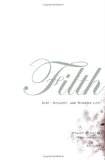

 |

|

The average rating for Filth: Dirt, Disgust, and Modern Life based on 2 reviews is 4 stars.
Review # 1 was written on 2011-11-04 00:00:00 Michael Augustine Michael AugustineIt is always enjoyable to find a book that draws together information that you are aware of, but have been unwilling, unable or even unsure how to make all the ideas and the parts fit. John Picker's Victorian Soundscapes is such a book. All books have sounds, be they a speaker's voice or a raging storm, or rumbles of a train or scrapes of chairs. But how exactly can a reader learn to better read these sounds, and thus find more satisfaction and enjoyment as well as gaining more insight into the text? To me, that answer was found in Picker's excellent and insightful text. Picker evolves his analysis from major novels by authors such as George Eliot and Charles Dickens. One of the great strengths of Picker's book is the ease by which a reader, once aware of how to listen as we read, can apply Picker's insights and arguments to any book. The application of a skill to a new situation is always a pleasure. As well as the codifying of sound into five catagories, one of which is silence, the reader is offered much supporting information. I was unaware of the fact that John Leech was driven to distraction and perhaps to his early death by the constant sounds of the street's organ grinders. What a delight to see many of Leech's illustrations of these annoying men drawn by Leech which appeared in Punch magazine. Thomas Carlyle has a soundproof room and Florence Nightingale in her "Notes on Nursing" drew connections between one's hearing and health. This book is for any reader who wants more insight and knowledge about the function and importance reading and understanding how sounds are developed and used effectively in novels. While its focus is firmly focussed and written about the Victorian Era, its scope and application is universal. |
Review # 2 was written on 2012-10-08 00:00:00 May Hegarty May HegartyOne of the most engaging books on sound I've read this year, "Victorian Soundscapes" examines the changing attitudes toward sound throughout the Victorian era by concentrating on the literature of the time. While previous knowledge of the written works referred to would obviously make this book's conclusions even clearer than they already are, prior knowledge of the texts discussed isn't necessary. Some of the works analyzed include Dickens' "Dombey and Son," George Eliot's "Daniel Deronda," Arthur Conan Doyle's "The Voice of Science," Bram Stoker's "Dracula," and Joseph Conrad's "Heart of Darkness." Along the way, other writings and events woven into the analysis include the writings on acoustics by Hermann von Helmhotz; the anti-immigrant cartoons of Punch magazine's John Leech; the far-fetched theories about sound and the atmosphere put forth by father of the computer Charles Babbage; the saga of Thomas Carlyle's attempt to design and build the first soundproof study in London; the histories of the development of the telephone, phonograph, and gramophone; and the origin of the painting "His Master's Voice" featuring the Victor Dog. In Picker's thoroughly researched book, Walter Benjamin's modernist conceptions of authenticity and aura are foreshadowed by the Victorian obsession with the new technology to record speech, with poets like Tennyson using their own phonographs to record libraries of their own voices. The noise made by street musicians becomes a battlefield for the rising middle class, and Cage's 4'33" is presaged by George Eliot's take on repression in the traditional Victorian roles of wife and husband. Thomas Edison and Alexander Graham Bell are shadowy background characters as the impact of recording and listening technological developments begins to be felt in the literature of the period, with plenty of factual information about the first recordings of music and voice to back up the literary analysis that is the book's focal point. This is a fascinating cross-disciplinary study of sound and literature, history and fiction. Anyone interested in sound theory, Victorian literature, or the development of modern technology will most likely find something of worth in this amazing book. Very highly recommended. |
CAN'T FIND WHAT YOU'RE LOOKING FOR? CLICK HERE!!!